
Shaping a career isn’t a linear journey for many professionals. Often, it involves a lot of trial and error, especially for those in the healthcare sector considering a transition to health technology or health informatics. This blog post aims to provide valuable insights for healthcare professionals and hiring managers in these industries. We have the privilege of chatting with Joey Trahan, an experienced analytics director at a leading provider of data and analytics technology and services to healthcare organizations. Joey’s journey into the world of healthcare technology showcases the transformative power of passion, data analysis, and embracing unexpected opportunities.
Stream and watch the full episode on our YouTube Channel, Apple Podcast, Google Podcast, Buzzsprout, and Spotify.
Unraveling the Inspiring Journey of a Health Tech Professional
Joey Trahan, now a respected analytics director at a leading provider of data and analytics technology and services to healthcare organizations, began his career in mass communications. Joey confessed that his early career years were filled with uncertainty as he tried to find what he was good at and enjoyed. He realized he had a natural gravitation towards numbers and automation, which ultimately led him to a fulfilling career in health technology.
Joey’s story offers a valuable lesson:
“Very few people come out of school knowing their career path. It’s okay to take some time to figure out what you’re good at and what you enjoy.”
While Joey didn’t plan on entering the healthcare industry, an opportunity presented itself, and he seized it. Initially, he was unaware of the high demand for data analytics in healthcare. However, he considers himself fortunate to have found a position where he can pursue his passion while making a positive impact on patient care. Joey’s story serves as a reminder that sometimes unexpected paths lead to fulfilling careers.
The Evolving Role of Healthcare Technology Professionals
Health technology professionals today are more than just data analysts; they play a critical role in influencing decisions in the healthcare setting. They pull data, look for patterns, and identify opportunities for improvements. Their input contributes to enhancing patient care and making healthcare operations more efficient. These responsibilities are on the rise, with the increasing demand for data analytics in healthcare.
In addition to their traditional role of analyzing data, healthcare technology professionals are now involved in strategic decision-making processes. They collaborate with healthcare providers, administrators, and policymakers to develop innovative solutions that address challenges in the industry. By leveraging their expertise in data analysis, they can identify trends and insights that have a direct impact on patient outcomes and the overall effectiveness of healthcare organizations.
Examining the Technological Impact on Healthcare
The proliferation of technology in healthcare is undeniable. With the onset of digital health records, every patient visit or clinical interaction generates a substantial amount of data. This data is valuable and, when harnessed correctly, can lead to improved patient outcomes and more efficient healthcare systems.
Healthcare technology professionals are at the forefront of leveraging this data to drive meaningful change. By employing advanced analytics and artificial intelligence (AI) algorithms, they can identify patterns, predict patient outcomes, and optimize treatment plans. This data-driven approach enables personalized medicine, where treatments and interventions can be tailored to individual patients based on their unique characteristics and medical history.
Tips for Healthcare Professionals Eyeing a Career Transition
Embarking on a career transition may seem daunting, but the possibilities in the realm of health technology and informatics are endless. Here are some practical tips for making the shift:
• Leverage your healthcare experience: Healthcare professionals possess firsthand knowledge of the intricacies of healthcare delivery systems, patient care processes, and data management. By applying this expertise, you can contribute to the development of more efficient and effective health technology solutions.
• Learn new skills: Basic programming skills and an understanding of data analytics are fundamental in this field. Moreover, obtaining certifications or completing courses in health informatics can provide you with a solid foundation and demonstrate your commitment to the field.
• Stay curious and open-minded: Health technology is a rapidly evolving field, with advancements in artificial intelligence, machine learning, and blockchain revolutionizing healthcare delivery. Stay updated with the latest trends and developments by following industry publications, attending conferences, or participating in online forums. Embracing a mindset of lifelong learning will ensure you remain at the forefront of innovation in health informatics.

A Glimpse into the Future of Health Informatics: Work Culture and Recruitment
The future of health informatics is marked by a significant shift in work culture, largely driven by the current trend towards remote work. Healthcare professionals transitioning into health informatics can now enjoy greater flexibility and work-life balance. Remote work enables professionals to contribute to health technology projects from anywhere, reducing geographical limitations and opening up opportunities for collaboration with teams around the world. As a result, healthcare workers seeking career transitions can explore health informatics roles without necessarily needing to relocate or compromise personal commitments.
However, it’s important to note that despite the remote work option, recruitment practices in the health informatics field remain rigorous. Employers are keen to ensure that professionals possess the necessary skills and knowledge to excel in this evolving domain. When considering a career transition, healthcare workers should actively pursue additional education or training specific to health informatics to enhance their marketability.
Embracing the Digital Revolution: How to Pivot into Healthcare Technology
Transitioning into health technology or health informatics can open up a new world of opportunities for healthcare professionals. If you’re thinking about making the leap, remember that it’s never too late to learn new skills and embrace the digital revolution in healthcare. With dedication and the right mindset, you too can make a significant impact in this field.
Joey’s parting words capture this perfectly:
“The journey in healthcare technology is a continuous learning process. Embrace it, and you’ll find it to be a rewarding experience.”
Don’t miss out on the latest insights and inspiring stories in the world of healthcare technology! Tune in to “The Pivotal Podcast” and join us as we delve into the future of healthcare technology and explore the remarkable journeys of individuals shaping the industry. From groundbreaking innovations to real-world implementations, our podcast is your gateway to staying informed and inspired.
Got questions? Drop us a message, and we’ll be in touch soon!


